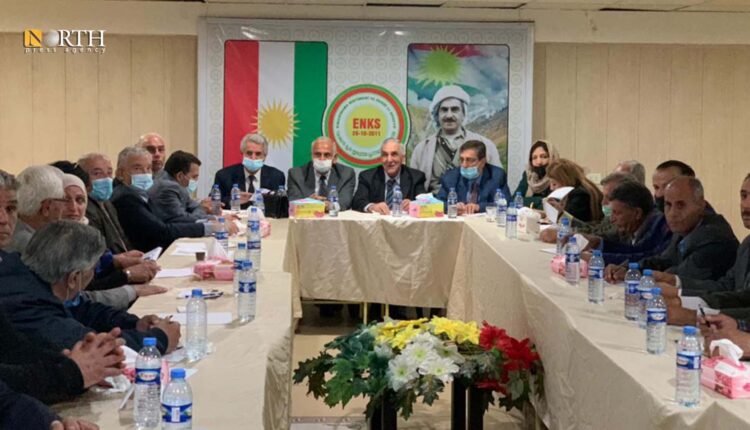Kurdish National Council Resumes Attendance at Syrian Opposition Coalition Meetings
By Kardo Roj
QAMISHLI, Syria (North Press) — The Kurdish National Council in Syria (KNC) has decided to resume the participation of its representatives in the meetings of the Syrian National Coalition, according to Faisal Yousef, spokesperson for the KNC. The decision, announced Tuesday, marks a step toward rapprochement between the Kurdish Council and the main Syrian opposition bloc, following a period of strained relations.
The KNC had previously suspended its attendance at Coalition meetings in September in response to alleged human rights violations in Kurdish-majority areas such as Afrin, Sere Kaniye (Ras al-Ain), and Tel Abyad, which are under the control of Turkey-backed factions. The decision to re-engage was made after recent negotiations between the KNC and the Syrian National Coalition’s leadership, culminating in a signed document that addresses key grievances held by the Kurdish Council.
Yousef explained to North Press that a KNC delegation met with Coalition leaders just days prior to the announcement, during which both parties agreed on a framework to address issues, particularly human rights concerns in contested areas. “The document includes clear mechanisms to address the violations occurring in Afrin, Sere Kaniye, and Tel Abyad, which led to the Council’s initial decision to suspend its attendance,” Yousef noted.
The spokesperson emphasized that this understanding led the KNC’s executive board to call on its representatives to resume participation in the Coalition’s meetings and to continue their regular duties within the framework of the Syrian opposition.
Background and Dispute Resolution
The Kurdish National Council has long held a complicated relationship with the Syrian National Coalition, a key opposition bloc largely aligned with Turkey. The KNC, which advocates for Kurdish rights and political autonomy within Syria, has repeatedly voiced concerns over reported abuses in Kurdish-majority regions under the control of Turkey-aligned Syrian militias.
These grievances came to a head in September when the KNC announced it would cease attending Coalition meetings, citing a failure by the Coalition to address or prevent abuses against Kurdish civilians in territories seized by Turkish-backed forces. Human rights organizations have documented reports of displacement, property seizure, and arbitrary arrests in Afrin and other areas, with calls for accountability within the opposition ranks.
In their recent negotiations, the KNC and Coalition leaders reportedly focused on mechanisms to monitor and address rights violations, seeking a balanced approach to shared opposition efforts against the Assad regime while mitigating intra-opposition disputes. According to Yousef, the document outlines specific actions and accountability measures to ensure that abuses in Kurdish regions are addressed more effectively, though the specifics of these mechanisms have not been made public.
Broader Implications for the Syrian Opposition
The KNC’s decision to return to the Coalition reflects a cautious optimism for renewed unity within the Syrian opposition. The KNC and other Kurdish political entities have often found themselves at odds with both the Syrian government and opposition forces, given their distinct demands for federalism and recognition of Kurdish cultural and political rights within Syria. The agreement with the Coalition could enable Kurdish representatives to have a more active role in opposition discussions while potentially reducing tensions between Arab-majority and Kurdish-majority factions within the opposition.

